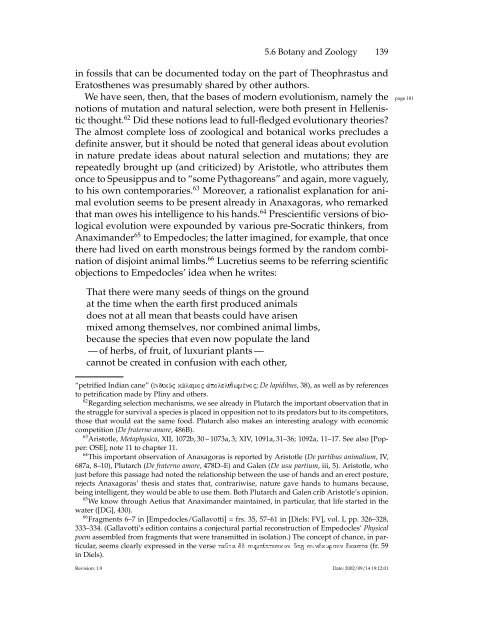1 The Birth of Science - MSRI
1 The Birth of Science - MSRI
1 The Birth of Science - MSRI
You also want an ePaper? Increase the reach of your titles
YUMPU automatically turns print PDFs into web optimized ePapers that Google loves.
5.6 Botany and Zoology 139<br />
in fossils that can be documented today on the part <strong>of</strong> <strong>The</strong>ophrastus and<br />
Eratosthenes was presumably shared by other authors.<br />
We have seen, then, that the bases <strong>of</strong> modern evolutionism, namely the page 181<br />
notions <strong>of</strong> mutation and natural selection, were both present in Hellenistic<br />
thought. 62 Did these notions lead to full-fledged evolutionary theories?<br />
<strong>The</strong> almost complete loss <strong>of</strong> zoological and botanical works precludes a<br />
definite answer, but it should be noted that general ideas about evolution<br />
in nature predate ideas about natural selection and mutations; they are<br />
repeatedly brought up (and criticized) by Aristotle, who attributes them<br />
once to Speusippus and to “some Pythagoreans” and again, more vaguely,<br />
to his own contemporaries. 63 Moreover, a rationalist explanation for animal<br />
evolution seems to be present already in Anaxagoras, who remarked<br />
that man owes his intelligence to his hands. 64 Prescientific versions <strong>of</strong> biological<br />
evolution were expounded by various pre-Socratic thinkers, from<br />
Anaximander 65 to Empedocles; the latter imagined, for example, that once<br />
there had lived on earth monstrous beings formed by the random combination<br />
<strong>of</strong> disjoint animal limbs. 66 Lucretius seems to be referring scientific<br />
objections to Empedocles’ idea when he writes:<br />
That there were many seeds <strong>of</strong> things on the ground<br />
at the time when the earth first produced animals<br />
does not at all mean that beasts could have arisen<br />
mixed among themselves, nor combined animal limbs,<br />
because the species that even now populate the land<br />
— <strong>of</strong> herbs, <strong>of</strong> fruit, <strong>of</strong> luxuriant plants —<br />
cannot be created in confusion with each other,<br />
“petrified Indian cane” ( ; De lapidibus, 38), as well as by references<br />
to petrification made by Pliny and others.<br />
62 Regarding selection mechanisms, we see already in Plutarch the important observation that in<br />
the struggle for survival a species is placed in opposition not to its predators but to its competitors,<br />
those that would eat the same food. Plutarch also makes an interesting analogy with economic<br />
competition (De fraterno amore, 486B).<br />
63 Aristotle, Metaphysica, XII, 1072b, 30 – 1073a, 3; XIV, 1091a, 31–36; 1092a, 11–17. See also [Pop-<br />
per: OSE], note 11 to chapter 11.<br />
64 This important observation <strong>of</strong> Anaxagoras is reported by Aristotle (De partibus animalium, IV,<br />
687a, 8–10), Plutarch (De fraterno amore, 478D–E) and Galen (De usu partium, iii, 5). Aristotle, who<br />
just before this passage had noted the relationship between the use <strong>of</strong> hands and an erect posture,<br />
rejects Anaxagoras’ thesis and states that, contrariwise, nature gave hands to humans because,<br />
being intelligent, they would be able to use them. Both Plutarch and Galen crib Aristotle’s opinion.<br />
65 We know through Aetius that Anaximander maintained, in particular, that life started in the<br />
water ([DG], 430).<br />
66 Fragments 6–7 in [Empedocles/Gallavotti] = frs. 35, 57–61 in [Diels: FV], vol. I, pp. 326–328,<br />
333–334. (Gallavotti’s edition contains a conjectural partial reconstruction <strong>of</strong> Empedocles’ Physical<br />
poem assembled from fragments that were transmitted in isolation.) <strong>The</strong> concept <strong>of</strong> chance, in particular,<br />
seems clearly expressed in the verse ¥ (fr. 59<br />
in Diels).<br />
Revision: 1.9 Date: 2002/09/14 19:12:01










